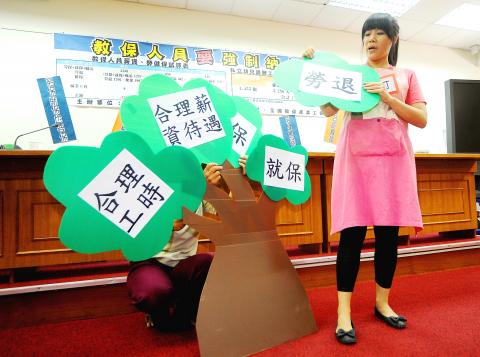President Ma Ying-jeou (馬英九) once described the nation’s low birth rate as a national security crisis, but “educarers,” the front-line workers caring for the nation’s young, have not been treated fairly, lawmakers and the Alliance of Educare Trade Unions said yesterday.
Nurseries and kindergartens were merged into preschools under the Early Childhood Education and Care Act (幼兒教育及照顧法) last year to provide proper care and education to children aged two to six.
However, the alliance said in a statement that during the amendment process, it sought to secure the labor rights of the educarers, but was then dumbfounded to find that under the new act, preschools, without negotiations with the affected groups, have tacitly become units that are only asked to “voluntarily” apply the provisions of the Labor Insurance Act (勞工保險條例).

Photo: Liu Hsin-de, Taipei Times
Democratic Progressive Party (DPP) Legislator Tuan Yi-kang (段宜康) said that before the enactment of the new act, all private nurseries were considered organizations operated for the public welfare and were automatically eligible for mandatory Labor Insurance coverage.
Even then, 19.7 percent of the nurseries did not have their employees covered, the alliance said.
“However, the new Act requires preschools to be registered as non-profit corporations with five or more employees before being eligible for mandatory Labor Insurance coverage,” Tuan said, adding that there are about 45,000 educarers in the nation, and only 3,100 of them, who work in public preschools, have mandatory coverage.
Apart from low wages and long hours, educarers are now deprived of mandatory coverage promised by the government, DPP Legislator Wu Yi-chen (吳宜臻) said.
“While paying a monthly salary of only NT$20,100, employers can avoid shouldering the NT$3,500 cost of Labor Insurance, Employment Insurance, Occupational Hazard Insurance and National Health Insurance under the existing regulations,” Wu said.
The financial burden is passed on to the government and educarers, who are now insured by their union if they are to be covered by Labor Insurance at all, Wu said. The government now has to pay 30 percent more than what it had to pay when the cost was split with their employer and the educarers 40 percent, Wu added.
Since 98 percent of educarers are female, the exclusion also means the birth subsidy funded by employment insurance — not insured by the occupational union — would be stripped from educarers who have children, Wu said.
Alliance of Educare Trade Unions director-general Wang Su-ying (王淑英) said that educarers have employers who should clearly bear the costs of insurance, rather than leaving that to their union.
In response, Council of Labor Affairs official Chen Hui-min (陳慧敏) yesterday said the council would consider requiring all preschools not yet registered as non-profit corporations to insure their employees under the Labor Insurance program and announce the resolution in a month.

Taiwan has received more than US$70 million in royalties as of the end of last year from developing the F-16V jet as countries worldwide purchase or upgrade to this popular model, government and military officials said on Saturday. Taiwan funded the development of the F-16V jet and ended up the sole investor as other countries withdrew from the program. Now the F-16V is increasingly popular and countries must pay Taiwan a percentage in royalties when they purchase new F-16V aircraft or upgrade older F-16 models. The next five years are expected to be the peak for these royalties, with Taiwan potentially earning

STAY IN YOUR LANE: As the US and Israel attack Iran, the ministry has warned China not to overstep by including Taiwanese citizens in its evacuation orders The Ministry of Foreign Affairs (MOFA) yesterday rebuked a statement by China’s embassy in Israel that it would evacuate Taiwanese holders of Chinese travel documents from Israel amid the latter’s escalating conflict with Iran. Tensions have risen across the Middle East in the wake of US and Israeli airstrikes on Iran beginning Saturday. China subsequently issued an evacuation notice for its citizens. In a news release, the Chinese embassy in Israel said holders of “Taiwan compatriot permits (台胞證)” issued to Taiwanese nationals by Chinese authorities for travel to China — could register for evacuation to Egypt. In Taipei, the ministry yesterday said Taiwan

Taiwan is awaiting official notification from the US regarding the status of the Agreement on Reciprocal Trade (ART) after the US Supreme Court ruled US President Donald Trump's global tariffs unconstitutional. Speaking to reporters before a legislative hearing today, Premier Cho Jung-tai (卓榮泰) said that Taiwan's negotiation team remains focused on ensuring that the bilateral trade deal remains intact despite the legal challenge to Trump's tariff policy. "The US has pledged to notify its trade partners once the subsequent administrative and legal processes are finalized, and that certainly includes Taiwan," Cho said when asked about opposition parties’ doubts that the ART was

If China chose to invade Taiwan tomorrow, it would only have to sever three undersea fiber-optic cable clusters to cause a data blackout, Jason Hsu (許毓仁), a senior fellow at the Hudson Institute and former Chinese Nationalist Party (KMT) legislator, told a US security panel yesterday. In a Taiwan contingency, cable disruption would be one of the earliest preinvasion actions and the signal that escalation had begun, he said, adding that Taiwan’s current cable repair capabilities are insufficient. The US-China Economic and Security Review Commission (USCC) yesterday held a hearing on US-China Competition Under the Sea, with Hsu speaking on